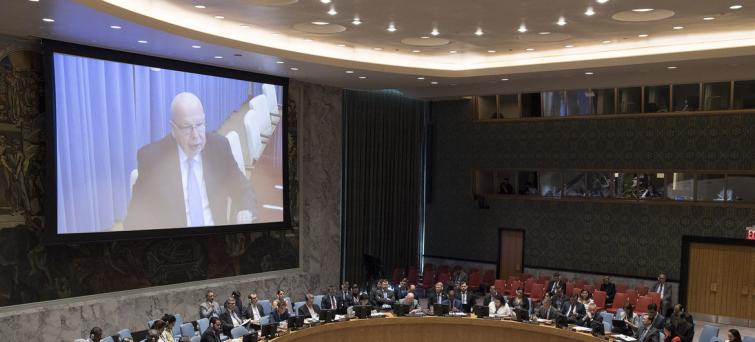
Threat from petty criminals who turn to terrorism, a growing concern, Security Council hears
New York, July 10 (IBNS): The less predictable threats represented by small-time criminals who have opportunistically embraced terrorism, are a source of growing concern, the UN Security Council heard on Tuesday. That warning came from Tamara Makarenko, an International Consultant, who works with the UN Interregional Crime and Justice Research Institute (UNICRI), speaking at an open debate on threats to international peace and security.
The long-time expert on the nexus between organized crime and terrorism, noted that at its most fundamental level, the link is based primarily on transactions and tactics, at the point where terrorists and criminals occupy “the same space at the same time”.
Noting various ways in which terrorist groups use illicit crimes to fund their operations, she said that the ISIL or Dae’sh terrorist group, saw from early on that it could draw funds from smuggling and the sale of illegal goods.
She added that smaller terrorist cells were focused on recruiting criminals in prisons, which have become true "incubators of the link", and a place for the exchange of knowledge, she continued.
She said that due to the scale and unpredictability of the petty criminal-turned terrorist, even local level criminality poses a serious and global threat. The international community must act, she said, cautioning that this heightened connection may hinder the ability to fight terrorism and increase vulnerability to criminal groups.
Invest more in fighting crime and terrorism together: Fedetov
Yuri Fedetov, Executive Director of the UN Office on Drugs and Crime (UNODC), said that criminals and terrorists shared a need to operate in the shadows, exploiting gaps in criminal justice responses in and between countries and regions. Human trafficking for sexual exploitation, child soldiers and forced labour can be used not only to generate revenue but to strike fear and recruit new fighters, he told Council members.
Dae’sh for example, had profited immensely from the illegal trade in oil, trafficking in cultural property they ransacked from places such as Palmyra in Syria, and Mosul in Iraq, and kidnapping for ransom. “We have also seen piracy and organized crime flourish on the high seas, including outside the justification of any single State and beyond the capacities of many countries to control,” he emphasized. He noted that the Al-Shabaab extremists in Somalia, supported piracy and finance some of their operations from trade in Somali charcoal through the Gulf of Oman, while the veteran Al-Qaida group, resupplies its forces around the Arabian Peninsula by sea.
He called for more resources to be channelled towards technical assistance to strengthen specialized expertise and capacities. This includes training for law enforcement, coast guards, border and airport officials, prosecutors, judges, prison officers and other relevant officials. “We need to reinforce investment in mechanisms for inter-agency, regional and international cooperation, including information and intelligence sharing,” he said.
Disconnect over taking on terror and organized crime, together: Coninsx
Michèle Coninsx, Executive Director of the Counter-Terrorism Committee Executive Directorate, outlined the Council’s various activities to combat the financing of terrorism, noting that the territorial losses sustained by Da’esh, which just a few years ago controlled large swathes of Syria and Iraq, had made it imperative for them to access funds through a wide range of criminal activities including drug trafficking, weapons sales, kidnapping and extortion.
Within the framework of country assessment visits, she said, the Executive Directorate engages with national authorities on how they view the links between terrorism and organized crime, as well as on cases in where clear links have been identified.
She said several best practices had been identified, such as creating joint investigative units and prosecution teams to handle both organized crime and terrorism.
She noted, however, that a significant disconnect continues to exist between the level of concern expressed by policymakers, the creation of legal frameworks addressing both terrorism and transnational organized crime, and the actual level of investigation and prosecution of cases as part of the same scourge.
The role of financial intelligence units should be strengthened, she said, noting that relevant agencies tasked with confronting the crime-terror nexus, too often operate in silos. “Institutional barriers to information-sharing, including between and among local and national authorities, should be overcome,” she told the Council.
UN Photo/Mark Garten
Support Our Journalism
We cannot do without you.. your contribution supports unbiased journalism
IBNS is not driven by any ism- not wokeism, not racism, not skewed secularism, not hyper right-wing or left liberal ideals, nor by any hardline religious beliefs or hyper nationalism. We want to serve you good old objective news, as they are. We do not judge or preach. We let people decide for themselves. We only try to present factual and well-sourced news.







